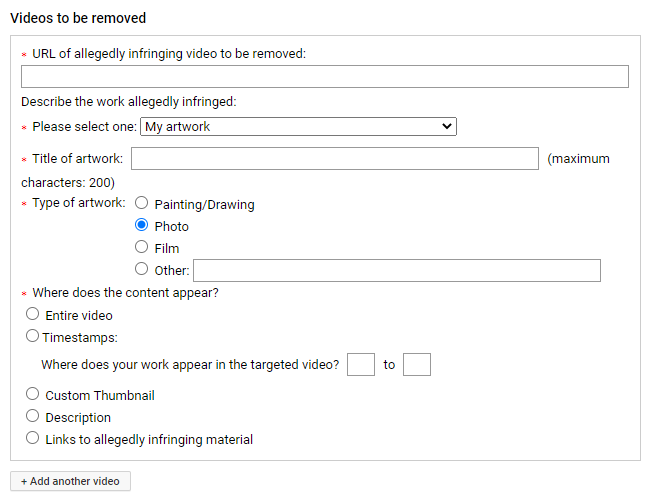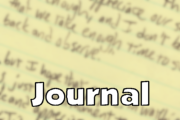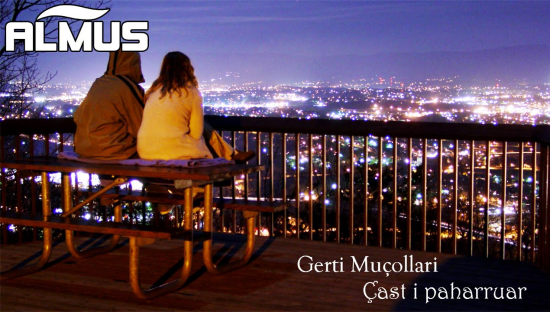The more they talk, the more irresponsible they sound…
8 minute read
April 23, 2020, 10:45 AM
So I have a new story about my experience enforcing copyrights, this one involving materials posted to YouTube. First of all, though, for those not familiar with how YouTube handles DMCA copyright takedowns, it is worth noting that their takedown form is a bit lackluster, though they’re usually pretty quick to respond. The problem is that YouTube doesn’t allow a claimant (i.e. me) to fully make my claim to ownership of a piece of video content, which has led to problems in the past. Here’s the relevant section of YouTube’s copyright form:

As you can see, I identify the specific video, then provide the name of my content, as well as identification of where in the video my content appears. The problem is that it doesn’t have a place for me to provide an authorized example of my work like other services provide. Coupled with YouTube’s taking a very strong stance on copyright infringements with its partners, this has lead to a lot of unnecessary negative interaction, where people tend to think that I’m just some loony, and not a content creator in my own right who is treating other people like adults. Providing an authorized example tends to remove all doubt about the veracity of my claims, seeing a clean version of the subject image in its original context. It also should be noted that Blogger, which is also a Google product, has a much better copyright process than YouTube, as Blogger allows me to provide an authorized example of my work in order to remove all doubt about the veracity of my claims, and also provides a dashboard so that I can track the status of my copyright claims after I have submitted them.
I’m also none too happy with YouTube for the way that they tend to treat smaller users. Back in 2018, when they revamped the “partner” program (and kicked me out of it for being too small), they also took the use of their copyright verification tools away from smaller users. Previously, I was able to pick violations right out of the search results and quickly take care of them on the spot, with most of the required information for a copyright claim pre-filled. It was quick and easy. When I inquired about what happened to the tools, YouTube responded this way:
Upon review of your CVP account activity, we have determined that your use of the tool is not within the guidelines of its intended use and your access to the tool has been disabled. The CVP tool is designed specifically for rightsholders who expect to have an ongoing need to remove content from YouTube and you have not demonstrated a need for its use. Specifically, you only submitted 10 complaints within the past year to remove 12 videos.
It seems our copyright complaint webform is better suited for your needs.
Thank you very much, YouTube. I’m glad that you know more than I do about what tools are most useful for me. Rather than being able to take care of copyright infringements quickly and efficiently with a dedicated tool for it, now I have to repeatedly fill out the same form for each infringement that I find. I really resent that kind of treatment, because takedown notices don’t make me any money, and they just doubled the time that it takes for me to prosecute them, especially when their form is one of the more bothersome forms out there. At that point, I would rather just send them an email, because I have that pre-written, and just have to drop in a few key bits of information and then send it off.
In any case, in this instance, I filed a copyright claim against a video posted by the Albanian company Almus Music for this image, used in violation of copyright:
This image originates in my Mill Mountain Park By Night set in Photography, third from last on the page. This photo, along with its companion that features the same couple, is a popular one for infringements.
Now as a commercial usage, I would normally send this to be handled by Pixsy, but Albania is not one of the countries that Pixsy currently operates in. So with no Pixsy involvement, I just filed the DMCA and blew it off of the Internet. Easy enough. Then the email came:
Hello Mr. Schumin,
We are contacting by Almus Music, related with a take-down of one of our videos published in Youtube. Due to our searches we thing you take it down for use of photo in video as background.
Could you please retract the take-down request, so we can remove that video?
Link: https://youtu.be/NaBN4dsyJrY
Best,
Stilo
Legal Department
Almus Music
What they were asking me to do was to withdraw my copyright claim, ostensibly so that they can remove it manually. The problem here is that with their being in Albania, the DMCA takedown process is really my only legal remedy for them, because I’m not filing suit in an Albanian court to stop them. Additionally, if I withdraw the claim, I can’t file a new DMCA claim should they not pull the video as they claimed that they would. So why should I trust them to do for me what I already did without them? After all, they already demonstrated that they were willing to steal photos and use them for commercial purposes.
My response was in line with this:
I see no reason to retract my takedown request, because I have no reason to think that you would actually remove the video from YouTube after a retraction. Rather, by retracting the takedown request, all that does is limit my ability to go after it in the future. Consider this copyright strike to be your warning not to use materials in violation of the licenses under which they are offered. If you had done your due diligence in the first place, I wouldn’t have had to do this. Don’t steal, and you won’t have anything to worry about. If you continue to steal, others might come after you like I did, and then you might have bigger problems.
In other words, your problem is not my problem, and I expected that would be the end of it. They responded:
Hello Ben,
I do understand your frustration but we are not any intention to infringe copyrights of creators. As publishing and distribution company we have cases that clients bring to us materials that are not original in all elements.
So we request your collaboration to retract that take-down so we can remove that video and we will not have issues with our channel. There are many cases when users are getting our songs and upload in any platform and we have been in same positions to protect our clients.
Hope in your understanding!
Best,
Stilo
Almus Music
I just wanted to say to them, “You know, you’re not helping your case here.” What they said in this response was that they have to deal with the same issues themselves that I’m dealing with them over, and they do it anyway. If you want me to help you out, that’s not the way to ask for it.
So I told him to go away:
Any issues that you experience with your channel that stem from your copyright infringement of my material are not my problem. Even more so when you just admitted to me that you fail to vet the materials that are posted under your brand to ensure that they are used legally.
Once again, enjoy your copyright strike with my compliments. I can’t say that you don’t deserve every last bit of it.
In other words, get lost. Their response took them from “guilty” to “guilty as hell”:
Hello Ben,
We do apologize for way you feeling but we are not here to express anger. We do accept that people abuse, so we can’t find everything that is over internet and who’s belongs to. These are things that happen and we are trying to respect in maximum the copyrights, as we protect music copyrights.
As I mentioned it happens that clients may bring us materials with images or songs that are copied or taken by internet.
Your understanding of our situation would be appreciated. Please retract the take-down, so we can remove that video.
Best,
Stilo
That greeting of “We apologize for [the] way you are feeling” really doesn’t help their case, especially if they needed my help as much as they claim. I’ve always taken “I’m sorry you feel that way” and similar to be a very diplomatically worded way of saying “f— you”. If “Stilo” is part of the legal department as his first email claimed, then he should have performed his due diligence and ensured that the image was being used properly. That he didn’t says a lot about how well this company handles its business.
I never responded back, because I really didn’t have anything else to say to them. But I got one more email from them that just took the cake:
Hello Ben,
Hope you doing well. Could you help us remove the strike on that video, to give us the opportunity to remove that video? We can delete that video before you retract the infringement, but we don’t have audio file saved for republish; so we are requesting you to retract the strike, to rip off the audio file and then to delete that video from our channel.
The only copy of the music that they had was the YouTube video, and so with that unavailable, they were up the creek. I suppose that this could go one of two ways: either they are incompetent, or they are lying. Neither option puts them in a particularly good light. Either way, it’s not my problem. As far as I was concerned, my business was complete once I got confirmation that the takedown had gone through. If they don’t have any other copy of the audio besides the public copy that was taken down, then I suppose that they made their bed, and have to lie in it.
I suppose that the lessons to be learned here are similar to those that we discussed in the Barbiturate matter from a few years ago. First of all, vet your material. If the graphics that included my photo were prepared by a third party, which they sort of indicated was the case, it’s still their responsibility to ensure that everything is on the up and up before they publish it under their brand. After all, they put their logo on it, too, and so with their name all over it, they are just as responsible for the infringement as whatever third party actually did the infringement. And secondly, don’t talk down to me. Barbiturate did that, questioning whether my photo was actually mine, and then telling me that they would give me image credit if I could prove that the image was actually my work. Then they ignored me when I offered to begin negotiations for licensing. I don’t provide my work in exchange for exposure. In this instance, talk about adding insult to injury: these jokers didn’t even offer to pay me in exposure. However, in this case, I made no offer to license, because I didn’t believe that I would ever get paid, and even if I did, I had no reason to think that someone wouldn’t have pulled the rug out from under me. Considering that I really couldn’t go after them legally owing to the distance, they would have gotten away with it, and I was not going to go there. In this case, I felt like their asking me to retract my claim so that they could fix it themselves was talking down to me. I knew where they were going with that. If I retracted my copyright claim, that would have given them exactly what they wanted, and they would have gone about their day, and I would have been left hanging the bag. No, thank you. And they certainly didn’t strengthen their argument by admitting to being buffoons. Sloppy practices all around do not lend confidence.
In the end, the moral of the story is the same as with Barbiturate, with my mother’s church, and with WJLA: don’t steal. If you’re going to use someone else’s work, make sure that you have documented permission to use said work, and never assume.
Categories: Copyright infringement










